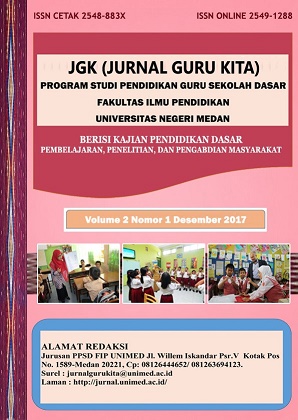PENGGUNAAN METODE STUDENT TEAMS ACHIEVEMENT DIVISION (STAD) UNTUK MENINGKATKAN HASIL BELAJAR MATEMATIKA DI KELAS VI SDN 101 HUTASIANTAR
DOI:
https://doi.org/10.24114/jgk.v2i1.10456Abstract
Abstrak : Penggunaan Metode Student Teams Achievement Division (STAD) UntukMeningkatkan Hasil Belajar Matematika Di Kelas VI SDN 101 Hutasiantar. Jenispenelitian yang digunakan adalah penelitian tindakan kelas yang terdiri dari II siklus,siklus I dan siklus II. Setelah dilakukan tindakan pada siklus I diperoleh tingkatketuntasan belajar siswa 61,9% yang berarti secara keseluruhan belum mencapai standarminimal ketuntasan belajar. Hasil tes pada siklus II diperoleh tingkat ketuntasan belajarsiswa sebesar 90,48% hal ini menunjukkan bahwa setelah dilakukan siklus II hasilbelajar siswa lebih meningkat dan dinyatakan bahwa mencapai ketuntasan klasikal ≥70%. Rata-rata nilai pada saat pre test adalah 48,33 meningkat setelah diberikantindakan pada post test siklus I menjadi 70,24 dan setelah diberikan tindakan kembalipost test siklus II meningkat menjadi 87,14. Dalam observasi siswa pada siklus I66,67% dan pada siklus II mengalami peningkatan 83,83%.Kata Kunci : STAD, Hasil belajar, Siswa, Pecahan.Downloads
Published
2018-08-11
How to Cite
Fakhruddin, F. (2018). PENGGUNAAN METODE STUDENT TEAMS ACHIEVEMENT DIVISION (STAD) UNTUK MENINGKATKAN HASIL BELAJAR MATEMATIKA DI KELAS VI SDN 101 HUTASIANTAR. JGK (Jurnal Guru Kita), 2(1), 76–82. https://doi.org/10.24114/jgk.v2i1.10456
Issue
Section
Articles
License
Authors published with the JGK (Jurnal Guru Kita) agree to the following terms:
- Authors retain copyright and grant the journal the right of first publication with the work simultaneously licensed under a Creative Commons Attribution License (CC BY-SA 4.0) that allows others to share the work with an acknowledgment of the work's authorship and initial publication in this journal.
- Authors are able to enter into separate, additional contractual arrangements for the non-exclusive distribution of the journal's published version of the work (e.g., post it to an institutional repository or publish it in a book), with an acknowledgment of its initial publication in this journal.
- Authors are permitted and encouraged to post their work online (e.g., in institutional repositories or on their website) prior to and during the submission process, as it can lead to productive exchanges, as well as earlier and greater citation of published work. (See The Effect of Open Access)


























